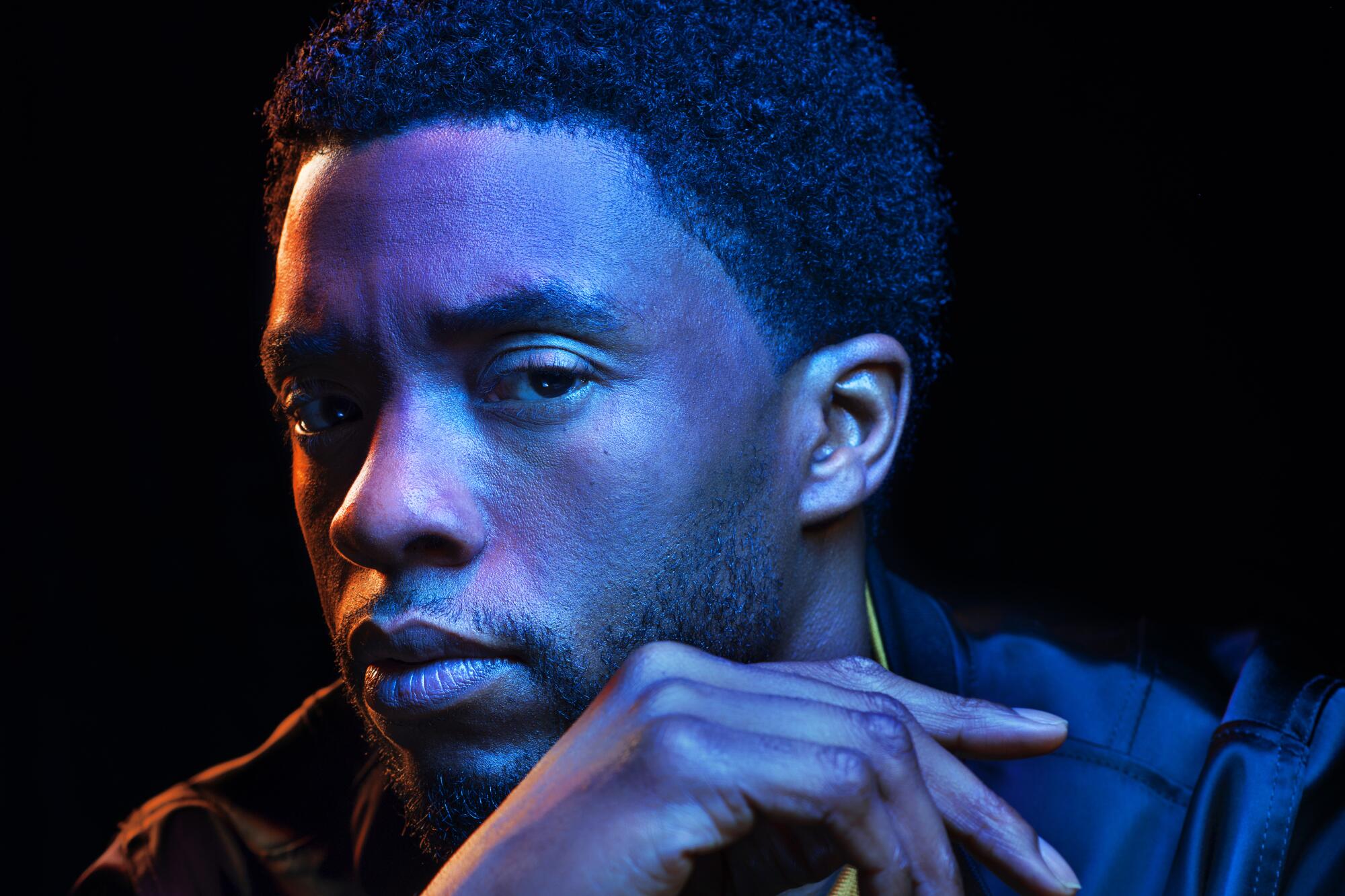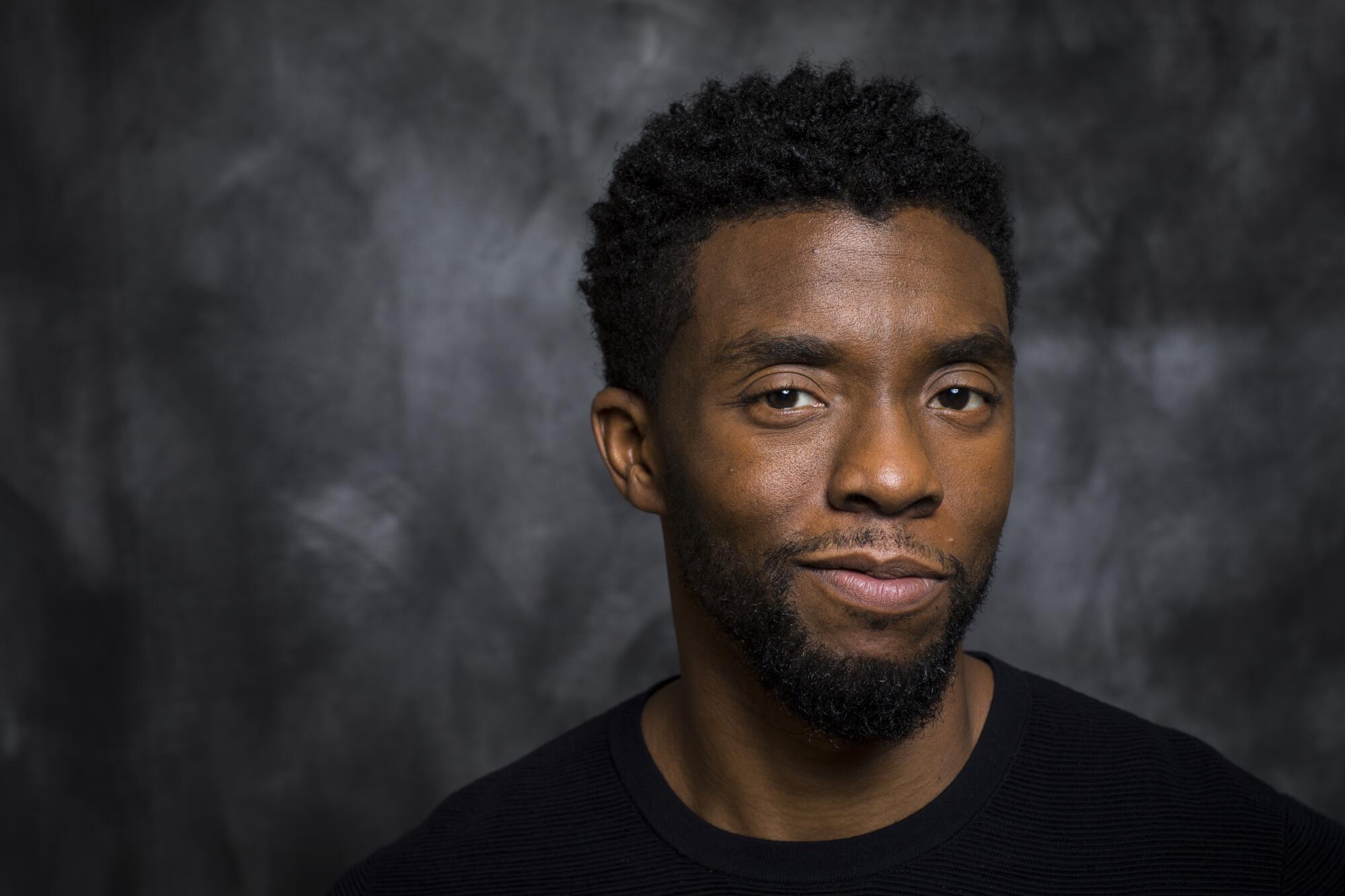
- Share via
To watch Chadwick Boseman in “Ma Rainey’s Black Bottom” is to see an artist fully committing to life. As Levee, an ambitious trumpet player fighting for his place in a system rigged against him, Boseman delivers a spellbinding performance, brash and charming, but also, underneath his bravado, deeply wounded by loss and injustice.
“Levee is ultimately a metaphor for America,” says George C. Wolfe, who directed the film adaptation of the 1982 August Wilson play. “How can you go forward into the future if you are haunted and controlled by the horror of the past?”
Levee would be Boseman’s final role, and his performance has won him a host of awards, positioning him as the favorite to win a posthumous Oscar. The movie was filmed in the summer of 2019, a year before Boseman’s death from colon cancer, a battle that the 43-year-old actor kept private. Those who collaborated with him on the film still can’t believe he’s gone, talking about him in the present tense and joyfully recalling his spirit and determination.
“He wanted to feel like he did everything he could possibly do,” says “Ma Rainey” costar Colman Domingo. “And he did.”
Here’s how they remember his final turn.
Colman Domingo (actor, Cutler): The first time I met Chad, he came in wearing a hoodie. He likes his privacy, and you knew that. He didn’t want to be Black Panther all the time. But that’s the first thing I noticed, like he was trying to be small in some way. But what I saw is: “Look at Black Panther walking in with a hoodie!”
Glynn Turman (actor, Toledo): Viola Davis took the initiative after an early rehearsal. She said, “Let’s all go to dinner and get drunk.” And we did. We had a great meal, and we closed the place. We let our hair down and got into it.
Domingo: That’s the true ensemble, to go and share a drink and share a laugh and take the piss out of each other. That sense of play is going to show up on stage, and that was our foundation. I felt we could go anywhere.
Turman: My fun time was watching him and his soon-to-be bride [Taylor Simone Ledward] relate to one another, watching that budding love affair develop. When he introduced me to her, she stumbled walking across the floor. I said to Chadwick, “Oh, she’s beautiful, Chad, but she’s clumsy.” And Chadwick cracked up. “You’re right, Glynn, she is.” And she just started hitting both of us. That’s how we got on. Just joshing.
Michael Potts (actor, Slow Drag): Oh, the smallest thing is going to get you razzed by everybody.
Domingo: “If you was any kind of musician ...” [Laughs]
Potts: That was the line. That was the first time we got him back, because he says that as Levee derisively dismisses Slow Drag. “If you was any kind of musician, you’d take better care of your instrument.” So he had a moment where he was picking up his trumpet and he dropped his mouthpiece. And it made a great racket. And everybody got real quiet, and then, real low, Glynn says, “If you was any kind of musician, you’d take better care of your instrument.” And he knew he was caught. And he doubled over. He knew.
George C. Wolfe (director): We spent that two weeks of rehearsal building trust and also to make sure that August Wilson’s language entered everyone’s body so it could fly around the room. You do that, and you can play and explore and try potentially exciting and dangerous and wrong and thrilling ideas.
Ruben Santiago-Hudson (screenwriter): Chad fully understood the rhythms, the melody of August’s writing. He also knew how important it was for him to imbue Black life with dignity and integrity. When Levee is misplayed as a character, you think all the wrong things about him. Played correctly, as Chadwick plays him, you see the hope that he has, the dreams that he has, the desire to be better, to do better, to want more.
Wolfe: One day in rehearsal, we were talking about the scene where Levee challenges God. And the emotions truly took Chadwick. And he went on a journey. And he ended up feeling as Levee did inside of the pain. It started out very casual, and then all of a sudden he was there. I think it caught him off-guard. Afterwards, Colman hugged him because he was sobbing. The pain of the character is so absolute.
Domingo: When Levee is railing against God’s will, it hurts. It hurts to admit that I don’t know what to feel if I don’t believe in God. It’s all our story. We know the truth of that trauma of racism.
Potts: It’s in our psyches. We know that song when we hear it. It’s a deep muscle memory.
Domingo: It’s the blues. And we were like a band. George cast us perfectly. Michael is one of the funniest, loving, joyful human beings. He likes to keep the spirits up. That’s part of his character as well. Glynn holds so much history. We look to him to move us forward. I’ve always been the equity deputy, the leader of the company. I don’t know why. And that’s part of Cutler.
Turman: And Chadwick, it was his youthful exuberance, his willingness to test and try everything. He was a daring performer. [Laughs] Should I tell it?
Potts: Yes, you should.
Turman: [Long pause] That last scene [where Levee confronts Toledo for stepping on his shoes], I knew they had two knives. One was a real knife. And, of course, one was a dummy. I saw Chadwick switch out that dummy knife and use the real knife. And I didn’t say anything. I knew what he was doing. He was going for the danger of it. I knew I wasn’t going to be hurt. I saw it, and I just had to trust him. As an actor, he needed that danger at that time.
Potts: He was the challenge. That’s where he was like Levee. he challenged everything you said, everything you did, everything you believed.
Domingo: “But what about this? What about this?” [Laughs]
Potts: Constantly. Or his phrase: “Give me one more.” It would surprise me how many times he did those scenes. You’d be like, “I think we got it.” [Laughs] “How many more times?” And he’d go, “One more. One more.”
Turman: Especially the one with that knife! [Laughs]
Potts: But that was him. He was always going to dare you. It was part of his character and part of his personality. “I dare you. Make this make sense.” And he would not stop.
Domingo: I’m not going to lie to you. I was right next to him with that trumpet. They’d say “cut,” and he’s still playing that. “Oh, my God, Chad.” But he was trying to become completely proficient. I’ll never forget one time going, “I’m going to kill him.” He kept playing — the entire time. That was his work ethic. Which I loved.
Potts: Basically daring himself. “I can do this one more time. I can go deeper.” He was challenging himself as much as he challenged everybody else.
Turman: “One more!” Pointing that long finger up in the air. He was a physical cat too. One time, we had a long, strenuous day, but he and [producer] Denzel [Washington] got to joshing around physically, just sparring with one another. Chadwick has martial arts skills, and Denzel is a student of boxing. So we’re watching the two of them go at, of course, pulling punches. But both of them knew what they were doing.
Domingo: Who won?

Potts: You know Denzel had to win! [Laughs] Chad knew that too. The boss won.
Domingo: The person who left after our wrap had so much spirit, so much life. It wore him out like it wore all of us out. We were all dragging our butts to the finish line. But we just thought that’s all it was. He had so much lightness and life. There was no sadness. If there was any pain or struggle, we didn’t see it. I think in that moment, he reached for life. He reached out to us, he reached out to the work to keep him going.
Santiago-Hudson: He was making a sacrifice to make this bold statement that August had presented to him: Here, deliver this. It’s shortsighted to reduce the performance to the pain he was in. Chad was deeper than that. ... Every time I talked to him, it was all about community. Responsibility.
Wolfe: I was working with Nora Ephron on [her final play] “Lucky Guy,” and she would come to my house, and I’d give her notes and we’d argue and talk. And she was on chemo that exact same time. I didn’t know that. I had a kidney transplant, and when I was on dialysis, I directed three shows. That’s what you do. You do your work, and you do it as rigorously and as passionately as you possibly can, because your work matters. And in the doing of the work, you are committing to life. That’s Chadwick. Every single time we communicated, it was about what was next. There wasn’t one conversation about anything coming to an end.
Turman: His performance didn’t have anything to do with the condition he was in. He was just that damn good. Period.
More to Read
From the Oscars to the Emmys.
Get the Envelope newsletter for exclusive awards season coverage, behind-the-scenes stories from the Envelope podcast and columnist Glenn Whipp’s must-read analysis.
You may occasionally receive promotional content from the Los Angeles Times.











